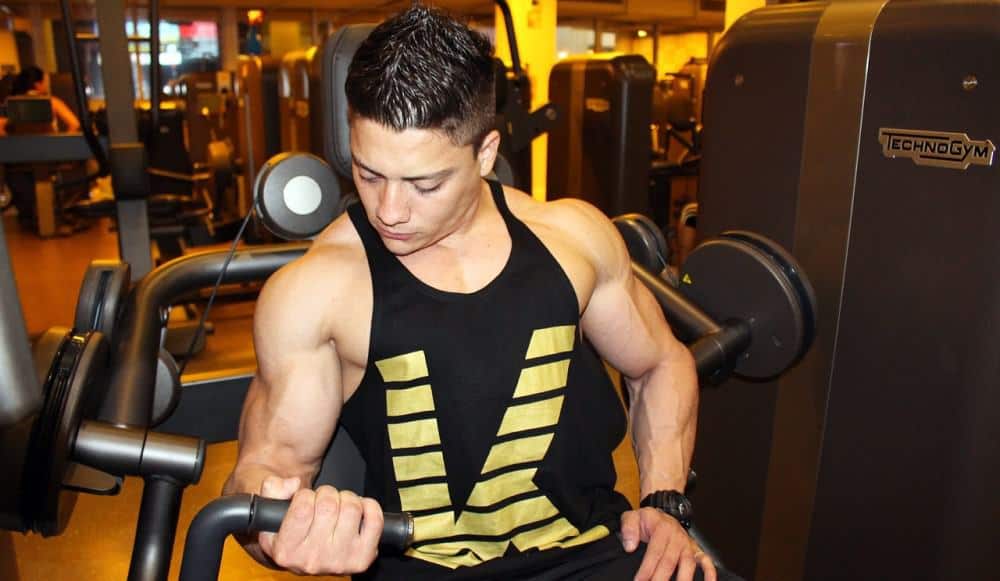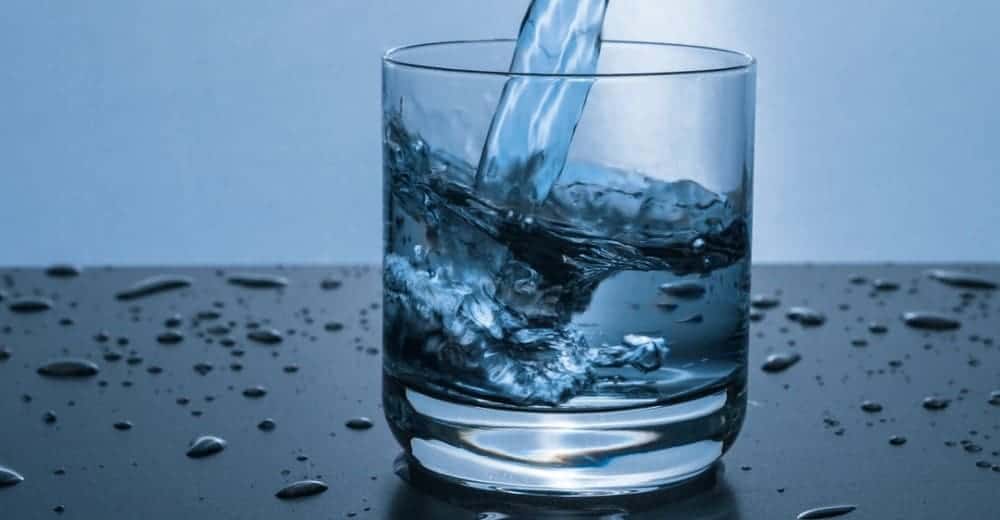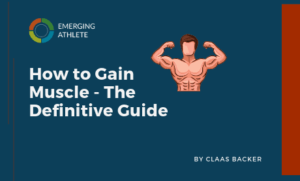You’re motivated. You’re committed. You’re training hard.
But it still feels like your not gaining any mass at all? That’s frustrating. I know how disheartening it can feel.
When I started working out in the gym, it was chaotic. I did not really have any clue about exercising, execution technique or nutrition. Not to mention frequency, volume and intensity.
Basically, I just went to the gym and did what the so-called “fitness trainer” advised me to do. Just a simple full-body programme.
Nothing wrong with that, especially for beginners this is the best thing to start with from my perspective. But that programme was solely composed of isolation exercises. I would always advise valuing free weight exercises over isolation work, particularly at the beginning of your training career.
Why would you start isolation your muscles before you build them?
The basic compound exercises are great to get a feeling for your muscles. They stimulate multiple muscles simultaneously and improve your strength tremendously.
I am actually doing a full-body workout since 3-4 months again. If you align volume, frequency, and intensity according to each other, it can bring you massive results.
On the one hand, you can train 3-4 times per week and accordingly exercise every muscle 3-4 times. That’s why it is crucial to align volume and intensity correspondingly. On the other hand, you save time for other things you value or that need to be done.

All the effort, time, blood sweat and tears for nothing. But what’s the mistake? Why is it that so many people fail?
It’s the diet. If you don’t eat enough, you won’t gain weight and respectively no muscle mass.
“You are what you eat.”
A lot of people account 80% of the results made in the gym leading back to nutrition. The actual workout only contributes 20% to whether you gain or not.
Does that mean you can cut your effort in the gym and train light, foolish and just once per week?
No, not at all. If that approach would work, everybody would be in shape. Nevertheless, you have to dedicate yourself to it.
Of course, it depends on your goals.
If you just want to get fit, a bit stronger and look and feel better, this might also work with only one workout per week.
But if you want to gain muscles and get bigger, I recommend training every muscle at least two times per week. Whether by using full-body, upper/lower or push/pull/leg split. It does not matter that much.
In fact, they all work. Some will work better for you and others may be worse. You’ll only find out what works best for you by trying.
There is no “perfect training programme”.
Regardless of which split you are using, it approximately accounts only for 20%. Working out hard in the gym every day that’s all well and good, but does not get you where you want to go.
You’re wasting a lot of potentials. This way you will spend a lot more time than actually necessary or even worse, you may not accomplish your goal at all.
“But I am eating so much every day”.
“My body just can not gain weight, it’s not made for”.
Who haven’t heard phrases like that? They are spread all over the gym.
What if I tell you there is a simple but effective solution for that?
Certainly it might be tougher for some people to gain mass than others, no doubt, but in the end, the concept remains the same for everybody.
No matter how big, small or tall you are. Calories are calories and if you exceed your basal metabolism, sooner or later you will gain mass. That’s the simple trick, there is no way around.
If you want to gain mass but the only thing you eat is some cereals for breakfast, a sandwich for lunch and a salad for dinner, you’re getting anywhere but not heavier on the scale, that’s for sure.
So, how do we fix this issue? How do you gain (muscle) mass?
In this article, I’ll give you 5 tips on how to gain (muscle) mass to finally overcome the obstacle that keeps you away from achieving your goal.
Track your calories
The first thing I emphasize you to do is track your calories. It’s that simple.
Especially for all the people who say: I am eating soo much, I can’t even eat more”, this will be the moment of truth for you.
I bet that the majority will be astonished how much less they eat than initially thought.
Whether you use android or IOs, go to the app store and download one of the various calorie tracking apps. For instance, I can recommend the MyFitnessPal app as I am using it for my purposes as well.
Having done that, depending on the app, you can either type in each food separately or just scan its barcode. The latter makes the whole thing way more convenient and pleasant.
I would suggest tracking your calories for at least for a whole week. Write everything you’re eating (including quantities) down on paper or directly into the chosen app.
Particularly in the beginning, until you get used to all the nutritional facts that all the foods contain that you’re eating, it is a good idea to keep an accurate track on everything you eat.
Preferably, you should prepare and cook all the food yourself. Its a lot easier to keep track of the quantities you ate that way.
For example, dining out in a restaurant with friends is obviously harder to track than cooking your own dinner at home.
Nonetheless, it’s totally viable to dine out every now and then but the better you can gauge your consumption the more efficient will be your tracking experiment.
Therefore, I recommend keeping as much of your diet “self-made” as possible during your first tracking week.
In the end, the overview will be more accurate and realistic. Furthermore, for all of you who seek using this weekly overview as a future point of reference, it is even more important for you to ensure precise outcomes.
Blenderize your food
The second tip I have for you guys is making use of liquid food. You don’t have to replace solid meals with fluent ones, you could, but that’s not necessary.
Whether you combine solid and fluent meals or only use shakes or solid meals, that’s at the end of the day up to you.
But, trust me, it can help you to gain weight!
This can work wonders for people who encounter problems eating bigger meals or struggle exceeding their basal metabolic rate in general.
If you don’t possess a blender, get one. It doesn’t have to be the newest and most expensive one, just search for second-hand blenders. You can get a well-used blender for like 20 bucks.
How does blenderized food help us to gain weight?
Think about it. Imagine you were about to eat 300 grams of rice, 300grams of chicken and some broccoli. This meal approximately has about 1400-1500 kcal.
Now, imagine you would make a shake out of whey protein, fruits, oats, dates, peanut butter, low-fat curd, and milk. Coconut flakes, oil, and butter illustrate further ingredients with a high-calorie density that boost your shake into the skies.
Dependent on the quantities you put in, you get a shake with at least 1500 kcal hassle-free.
Comparing both meals, which one is easier to consume and digest? Exactly, it’s the shake.
At the same time, there are no restrictions. No limitations. You can be as creative and crazy as you want to. From my personal experience, I can tell you, it works.
If you’re having a busy day not eating a lot at all, it’s easier to drink your meal than gorging plate after plate. You can even combine both. Besides your normal, solid dinner just add a shake aligned to the remaining calories for the day.
It not only tastes good but ensures you to reach the required calories and make the scale display progress.
Eat high-calorie groceries
The third aspect I want to emphasize today is relatively self-explanatory.
Eat more foods with a high calorie density.

It is the opposite principle of a diet. If you want to lose weight you should eat low-calorie foods like most fruits and vegetables.
However, if you want to gain weight, you should eat high-calorie foods. These include rice, pasta, and oatmeal. Fat fish, avocado and nuts. Greasy cheese, bananas, and whole grain products are all great to gain mass.
For example, nuts, fruits, and oatmeal can build the foundation of your breakfast. Add coconut flakes, dates, milk or honey on top and the calories go skyrocket.
Albeit, you should not neglect to keep your diet healthy and balanced.
Therefore, it is advisable to focus on high-calorie foods to finally eliminate frustrating, disappointing and bothersome moments on the scale.
Check your weight regularly
As a fourth tip to help on your journey to finally gain more mass, it is important to check your weight on a regular basis.
If you don’t own a scale, I would profoundly advise you to get one!
What’s the point in putting all the effort into training and diet but staying in the dark at the end of the day?
Tracking your progress is crucial. Either in the gym, on the scale or your calories. If you don’t take care of such essential things, it will not work.
Just as I suggest to track all your food for one week, I suggest getting on the scale every morning for one week.
First thing in the morning, before you eat breakfast or drink a glass of water. It is important to keep the circumstances as accurately as possible every morning.
Then you write down your weight. Whether it’s on paper, on your laptop or smartphone, whatever is most convenient for you.
But make sure to be consistent and repeat this every morning for one week. It’s normal that your weight does not gradually increase all the time. Deviations in both ways, either up or down, that’s part of it. Don’t worry and get used to it.
As building muscles is not a sprint but a marathon, just as little it is linear but volatile.
Plans don’t always work out. That’s not the most important thing. It’s a lot more important to have a plan but still be flexible to adapt to new circumstances.
Drink enough
Finally, I emphasize you to pay attention to your fluid balance.
“You can survive for a week without food but only for a few days without water”.

Most of you probably heard that sentence at least once in your life. Either from your parents or friends.
It is well known that the human body needs water to survive.
The body and every single cell need water. In total, the human body consists of 60% water.
Water is in the bloodstream and is responsible for countless tasks. Transporting nutrients and gases, keeping the electrolyte balance of blood pressure and regulating body temperature, to just mention a few.
This study breaks down the effect of water on the human body functions, composition and other influences.
You will probably have experienced that you feel dizzy when you drank too little and want to get up quickly out of a sitting position. This is due to the reduced volume of liquid. The blood reaches the brain and dizziness occurs.
Most people live in a permanent state of inadequate hydration. Studies show that an unbelievable 75% of Americans suffer from dehydration.
Even a lot of folks work out in a dehydrated state. Studies show that 40% exercise dehydrated.
When the workout starts, you will lose extra water, especially if you are moving heavy weights. Exercising intensively and in a warm environment facilitate that even further.
But how does water affect muscle growth or gaining (muscle) mass?
Studies have shown that once cells lose water, protein production can slow down and protein breakdown hastens. But, it’s worth noting that those studies are carried out in-vitro instead of an animal or human.
Thus, similar research is required on the relationship between hydration and its impact on muscle mass breakdown.
One way in which dehydration can affect muscle growth is by limiting our performance during the workout. If you repeat this workout after workout, you’ll certainly leave potential untouched.
It is well known that volume training is the most important factors when it comes to muscle growth. However, if it is limited by dehydration, obviously muscle growth is minimized.
If you’re not yet familiar with volume, check out our complete guide about the optimal volume for hypertrophy.
As soon as you workout in a dehydrated state, you will feel tired and exhausted faster, may even get headaches, and may not be able to provide the motivation you would have with sufficient hydration.
Furthermore, the heart must work harder, resulting in premature fatigue.
After we’ve covered a lot of detriments due to hydration, it is important to know how much water is enough.
Personally, I am trying to drink 1 liter of water per 20kg of bodyweight. For instance, this would mean 4 liters for an average 80kg person. This is your basis.
But, keep in mind, all the water you sweat out during exercise needs to be added upon that! Make sure to supply your body with sufficient water during intense workouts.
At the end of the day, nobody can tell you exactly how much water you need. This is always different and varies individually.
Try to experiment and figure out which amount works best for you.
An article published by the Harvard Medical School states as a rule of thumb to drink 2-3 cups of water every hour, during exercise and heat even more.
But here are some simple guidelines that you can use:
- Try to avoid getting thirsty
- During heat and exercise, make sure to supply your body with sufficient water to compensate the lost fluids
- Always have some water in your bag to be prepared throughout the day
Conclusion
Let’s recap how you will finally achieve proper muscle growth and gain weight!
- Track your calories
This helps you to avoid overestimating your consumption and get on the right path on your journey to gain mass.
- Blenderize your food
Drinking your meal instead of eating it feels a lot easier. Especially for people who have difficulties eating larger quantities and to exceed their basal metabolism, this can work wonders.
- Eat high-calorie foods
It’s that simple. Obviously, eating high-calorie foods facilitates to reach your daily calorie goal. It’s the opposite principle of a diet. If you want to lose weight, eat low-calorie foods. If you want to gain mass, focus more on high-calorie foods.
- Check your weight regularly
Just as tracking your calories is important, the scale indicates whether you’re on the right track or not. If you think you’re eating enough but the scale does not move upward or even downward, certainly something is wrong!
- Drink enough water
The human body needs water to survive. There is no way around drinking sufficient liquids every day. Staying dehydrated also affects our physical performance and restricts muscle growth potential as well as essential body functions.
I hope this article helped you to finally overcome the obstacle that keeps you away from gaining more (muscle) mass.
Which of these tips is your favorite one? What other secrets do you have to gain mass?
Leave a comment below and share your experiences with us!
Thanks for reading, guys.
Claas





2 thoughts on “5 Tips How to Gain (Muscle) Mass”
Some rеally wonderful info, Gladiolus ӏ detected
this.
Thank you!